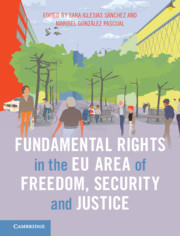Book contents
- Fundamental Rights in the EU Area of Freedom, Security and Justice
- Fundamental Rights in the EU Area of Freedom, Security and Justice
- Copyright page
- Dedication
- Contents
- Contributors
- Foreword
- Preface
- Common Abbreviations
- Introduction Fundamental Rights at the Core of the EU AFSJ
- Part I The General Framework for Fundamental Rights Protection in the AFSJ
- Part II Asylum, Migration and Borders
- 4 Mutual (Dis-)Trust in EU Migration and Asylum Law: The ‘Exceptionalisation’ of Fundamental Rights
- 5 The Right to Liberty in the Field of Migration, Asylum and Borders
- 6 Family Life and the Best Interests of the Child in the Field of Migration
- 7 The EU Fundamental Right to Asylum: In Search of Its Legal Meaning and Effects
- 8 Effective Remedies and Defence Rights in the Field of Asylum, Migration and Borders
- Part III Judicial Cooperation in Civil Matters
- Part IV Judicial Cooperation in Criminal Matters and Police Cooperation
- Part V Cross-Cutting Issues of Fundamental Rights in the AFSJ
- Index
7 - The EU Fundamental Right to Asylum: In Search of Its Legal Meaning and Effects
from Part II - Asylum, Migration and Borders
Published online by Cambridge University Press: 06 August 2021
- Fundamental Rights in the EU Area of Freedom, Security and Justice
- Fundamental Rights in the EU Area of Freedom, Security and Justice
- Copyright page
- Dedication
- Contents
- Contributors
- Foreword
- Preface
- Common Abbreviations
- Introduction Fundamental Rights at the Core of the EU AFSJ
- Part I The General Framework for Fundamental Rights Protection in the AFSJ
- Part II Asylum, Migration and Borders
- 4 Mutual (Dis-)Trust in EU Migration and Asylum Law: The ‘Exceptionalisation’ of Fundamental Rights
- 5 The Right to Liberty in the Field of Migration, Asylum and Borders
- 6 Family Life and the Best Interests of the Child in the Field of Migration
- 7 The EU Fundamental Right to Asylum: In Search of Its Legal Meaning and Effects
- 8 Effective Remedies and Defence Rights in the Field of Asylum, Migration and Borders
- Part III Judicial Cooperation in Civil Matters
- Part IV Judicial Cooperation in Criminal Matters and Police Cooperation
- Part V Cross-Cutting Issues of Fundamental Rights in the AFSJ
- Index
Summary
The EU fundamental right to asylum, enshrined in Article 18 of the Charter, has always been a subject of scholarly debate. While some scholars have interpreted Article 18 as limited to a right to seek asylum, others have argued that it also confers an individual right to be granted asylum under certain conditions. Clarifying the scope and effects of the EU fundamental right to asylum is no longer of purely academic interest; courts across the EU are increasingly faced with complaints regarding its violation following the EU’s and Member States’ policy responses to the 2015 refugee crisis. The debate has been fuelled by the broad wording of the EU fundamental right to asylum, defined in relation to the rules of the Refugee Convention and EU Treaties. This chapter considers the scope of Article 18 of the Charter compared to the principle of non-refoulement guaranteed by the 1951 Refugee Convention; the extraterritorial application of the EU fundamental right to asylum and its content; and the main actors contributing to the normative clarification of the right to asylum. The chapter demonstrates the added value of the EU fundamental right to asylum as reflected in its various functions at EU and national levels.
Keywords
Information
- Type
- Chapter
- Information
- Publisher: Cambridge University PressPrint publication year: 2021
